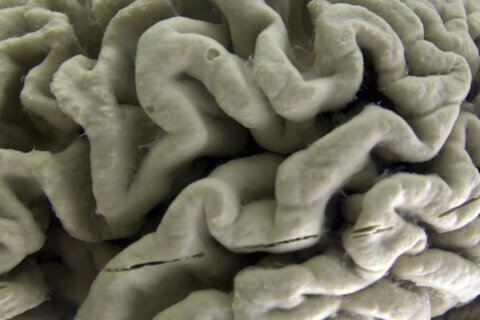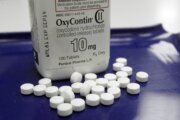Donning that white coat the first day of medical school may seem like a far-off dream for high school students who want to become physicians. But students can take several steps in high school to begin the long journey toward a career in medicine.
At the top of the list is enrolling in the most rigorous science and math courses your high school offers.
“The first thing you want to do is find out — do you like science and can you do well in it?” says Luisa Rabe, an educational consultant who works with students applying to med school. “If you don’t like science and you aren’t good at it, (then) medicine, nursing or pharmacy — nothing is going to work.”
High school students can also get a feel for the field by volunteering in their local hospital, nursing home or hospice, or by shadowing a medical professional.
“We want to know that the students know what they’re getting into, so that means shadowing physicians and that means volunteering in a clinical setting,” says Dr. Christine Hay, associate dean for admissions at the University of Rochester School of Medicine.
If you are considering a medical career, here are five tips on how to start preparing in high school:
— Take the recommended high school classes for a premed major.
— Volunteer at your local hospital or nursing home.
— Participate in a health professions program.
— Enroll in a summer program in health care.
— Choose a college with med school in mind.
[READ: What to Do in High School to Prepare for College.]
Take the Recommended High School Classes for a Premed Major
Students should develop a strong academic foundation by taking advanced courses at their high school, and not only in math and science. Beyond taking Advanced Placement or International Baccalaureate classes in biology, chemistry and physics — common prerequisites for med school — students should also enroll in advanced courses in English and writing.
“Paying attention to your English and writing courses and proving that you’ve got good communications skills — all these things go into making a good physician,” says Dr. Kevin Holcomb, associate dean for admissions at the Weill Cornell Medical College at Cornell University in New York.
Taking a foreign language can also be useful to your future career in medicine, Rabe says. “Try to become fluent in something,” he suggests. “If you learn another language, then you have a sense of otherness and how people look at the world differently.”
Volunteer at Your Local Hospital or Nursing Home
Preparing for med school means experiencing what it’s like to take care of others. The tasks you are assigned don’t matter as much as the ability to observe how patients are treated in a clinical setting.
“Volunteering in a hospital is a great way to get some insight on the doctor-patient relationships or just get a feeling for what it’s like being a healer,” Holcomb says. “Even transporting a patient to a test can give you a feeling of what it would be like to be on the other side.”
High school students should also consider volunteering in other areas of their community, which is something that med schools value in their applicants.
“It’s really important for physicians to be people who give back to their communities,” Hay says. “I think it gives our students some great experience in dealing with people from all different walks of life and understanding the struggles that people go through.”
[READ: Why High School Students Should Consider Volunteer Opportunities]
Participate in a Health Professions Program
Many high schools offer career-oriented courses in health and medical science, and programs can include opportunities for mentorship or volunteering.
For example, at Springdale High School in Arkansas, students enter the Medical Academy in 10th grade and take three years of courses in health services, which leads to certification in CPR or patient care technology in their senior year. Students are also assigned to a mentor from the local medical community.
“The Medical Academy offers students the opportunities to job shadow, to do volunteer work for medical professionals and to be exposed to work in a hospital or medical office,” says Annick Downing, a school counselor at Springdale High. “These opportunities exist for other students, but they have to seek it out themselves.”
Enroll in a Summer Program in Health Care
High school students can gain research experience or get a preview of med school at a wide range of summer programs held at universities and hospitals across the country.
Weill Cornell Medicine, for example, offers several programs for New York City high school students from groups that are underrepresented in medicine. The goal is to expose these students to medical professionals and opportunities in the field.
These programs also address a dual problem the medical field is facing: a shortfall in the number of physicians expected in the next decade and the underrepresentation of Blacks, Hispanics and Native Americans in medicine. “We’re trying to do our part to expose as many people to medicine early on, but at the same time focusing on the groups that are underrepresented,” Holcomb says.
[READ; Use College Goals to Choose High School Senior Year Courses]
Choose a College With Med School in Mind
When you begin your college search, look for a school that has strong premed advising. That will help ensure that you are taking the right prerequisites, gaining needed clinical experience and preparing for your med school applications.
While students get into med school from all types of colleges, Rabe recommends that students consider a smaller liberal arts school where they will have more interaction with faculty members, more opportunities to do research and more one-on-one time with premed advisors.
Premed students can major in any subject as long as they take the required courses for med school — biology, chemistry, physics and math. At the University of Rochester School of Medicine, for instance, 40 percent of the students are non-science majors.
“I tell people to major in what you are interested in — your passion,” Hay says. “You’re going to do better in that anyway.”
More from U.S. News
How to Choose High School Electives
How Schools Are Improving STEM Education for Girls, Students of Color
Five Tips for High School Students Considering Premed originally appeared on usnews.com







